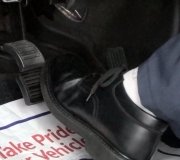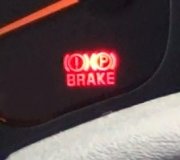Hi guys. Excuse me for butting in, but you are overlooking an important point. Besides no need to bleed the system, a lot of do-it-yourselfers AND inexperienced mechanics cause a problem by thinking it is necessary to pedal-bleed with a helper. The problem comes when they push the brake pedal all the way to the floor. That will often damage a master cylinder that is more than about a year old. Crud and corrosion build up in the bores where the pistons don't normally travel. Pushing the brake pedal to the floor, whether bleeding improperly, or when surprised by a sudden leak, runs the rubber lip seals over that crud and can rip them. That can result in a slowly-sinking pedal, and that often does not show up for a few days. It can also result in no brakes at all if both seals are torn.
If the truck has anti-lock brakes, it is correct that a scanner may be needed to command the computer to open two chambers so the air can be expelled, but only if you allowed the reservoir to run empty. That is another common mistake, but only when the hydraulic system is opened to replace a part. If you just slapped new pads on, which is just a fraction of a professional brake job, there is no need to bleed the system. It is recommended by every manufacturer to replace the brake fluid periodically, along with the moisture it absorbs, but few of us do that because the systems are so trouble-free. When you do that maintenance service, just let most of the old brake fluid run out, then fill the reservoir with clean, fresh fluid, and let that run through. As long as the reservoir never runs empty, no air can get in.
The only bleeding method I use is gravity-bleeding. No helper is required, but it does take a little longer. Loosen the cover on the reservoir to prevent vacuum from forming that would inhibit the free flow of the brake fluid. Open all the bleeder screws for just the wheels that need to be bled. If no fluid runs out after about five minutes, "irritate" the brake pedal a little, by hand, to get the flow started. When no more bubbles are coming out, close that bleeder screw, then wait for the next one to start flowing. When they are all closed, work the brake pedal a little by hand again to wash the few sticking bubbles into the calipers or wheel cylinders. Open each bleeder screw once more to let those few bubbles pop out, and you're done.
JIS001 mentioned pushing the pistons into the caliper housings. That is necessary to fit the new, thicker pads in place. Once everything is assembled, you have to manually run those pistons back out until the pads contact the rotors. If you reused the old rotors, they will be worn a little thinner than they were originally. The result is you may be able to push the brake pedal all the way to the floor before the pads make that initial contact and pedal pressure builds up. That can also damage the seals in the master cylinder. I tell my students to pretend there is a 4x4 block of wood under the pedal, and to never ever push the pedal past that block.
If it does appear you need to replace the master cylinder, I have a trick that eliminates the need to bleed at the wheels, but it works best when there are only two steel line connected to the master cylinder. Ford connects four lines, two on each side, to a lot of their vehicles. My trick still works on those, but it takes a little longer.
Wednesday, March 10th, 2021 AT 11:14 AM



